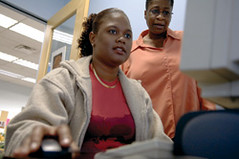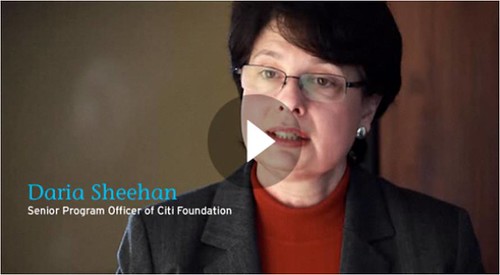Financial Opportunity Centers help transform distressed areas into stronger communities

Posted July 23, 2010 at 1:29PM
At first blush, it may seem odd for an environmentalist to get professionally excited about a social services program. But there’s a solid connection: if currently disadvantaged communities can become stronger, they can retain and restore population and attract investment that might otherwise go to sprawl. Continued poverty in and disinvestment of city neighborhoods, in particular, only exacerbates sprawl-induced greenhouse gas emissions, wasteful land consumption, and the spread of pavement across rural watersheds.
One laudable attempt to strengthen these communities is provided by the Financial Opportunity Centers sponsored in several cities nationwide by the Local Initiatives Support Corporation.  Based on a model developed by the Annie E. Casey Foundation, the centers are local collaborations with community-based nonprofits that offer three core services: (1) employment training and placement services; (2) financial counseling, education and long-term coaching; and (3) assistance in accessing the complex array of public and tax benefits for which residents might qualify. LISC currently supports 33 Financial Opportunity Centers in disadvantaged neighborhoods nationwide, having first piloted the model in Chicago back in 2004.
Based on a model developed by the Annie E. Casey Foundation, the centers are local collaborations with community-based nonprofits that offer three core services: (1) employment training and placement services; (2) financial counseling, education and long-term coaching; and (3) assistance in accessing the complex array of public and tax benefits for which residents might qualify. LISC currently supports 33 Financial Opportunity Centers in disadvantaged neighborhoods nationwide, having first piloted the model in Chicago back in 2004.
According to LISC, participants who are able to access these services together are more likely to find and retain jobs, grow their net incomes and their net worth, and improve their credit scores, all while learning how to develop effective budgets, access appropriate mortgage and other financial products, and participate in benefits like the Child Care and Earned Income Tax Credits.
Even better, LISC will soon be expanding its centers, thanks to a new grant just announced yesterday: in particular, the organization was awarded $4.2 million under the Obama Administration's new Social Innovation Fund (SIF) to create new and expanded Centers in Chicago, Cincinnati, Detroit, Duluth, Houston, Indianapolis, Minneapolis/St. Paul, San Diego, and the San Francisco Bay Area.
 In a press release heralding the grant, Kevin Jordan, director of LISC's national Family Income and Wealth Building program, noted that "[p]articipants' outcomes are monitored, pitfalls reviewed, opportunities discussed and plans adjusted to respond. In effect, the Centers have taken a version of long-term financial planning that is commonplace among more affluent residents and tailored it to the needs of low- and moderate-income families."
In a press release heralding the grant, Kevin Jordan, director of LISC's national Family Income and Wealth Building program, noted that "[p]articipants' outcomes are monitored, pitfalls reviewed, opportunities discussed and plans adjusted to respond. In effect, the Centers have taken a version of long-term financial planning that is commonplace among more affluent residents and tailored it to the needs of low- and moderate-income families."
LISC launched the centers because working families in poverty struggle from paycheck to paycheck trying to pay for food, housing, clothing, and other basic necessities. For a family earning low wages, one bad loan can set them back financially for years. Despite years of building and strengthening community-based employment centers, wages among participants in LISC-funded programs have remained relatively low. LISC and others concluded that employment alone is not always enough to help low-income households achieve financial independence. Go here for a brochure describing the Financial Opportunity Centers.
For a nice short video produced by the Citi Foundation, a partner with LISC in establishing the centers, click on the image below (since the video could not be embedded, the link takes you off-site):
The Local Initiatives Support Corporation is a well-known organization that works to help nonprofit community development corporations revitalize distressed neighborhoods. Since 1980, LISC has raised more than $9.7 billion to build or rehab more than 271,000 affordable homes and develop 40 million square feet of retail, community and educational space nationwide. According to the organization, its support has leveraged $31.1 billion in total development activity. For more information, visit www.lisc.org. NRDC is currently exploring possibilities for collaboration with LISC to create model smart, green, inclusive redevelopment.
The Corporation for National and Community Service, which administers the Social Innovation Fund grant program, is a federal agency that engages more than five million Americans in service through its Senior Corps, AmeriCorps, and Learn and Serve America programs, and leads President Obama's national call-to-service initiative, United We Serve. For more information, visit NationalService.gov. Click here to read the complete list of SIF grantees and to learn more about the Fund.
Move your cursor over the images for credit information.
